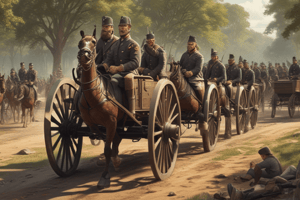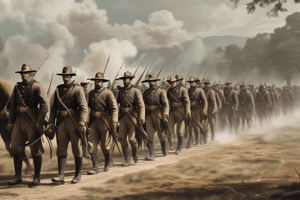Podcast
Questions and Answers
What was the main purpose of Sherman's March to the Sea?
What was the main purpose of Sherman's March to the Sea?
- To protect Atlanta from Confederate attacks
- To defeat Robert E. Lee's Army of Northern Virginia
- To secure the city of Savannah
- To maximize foraging and live off the land (correct)
Why did Sherman propose to cut his army loose from Atlanta as a logistical base?
Why did Sherman propose to cut his army loose from Atlanta as a logistical base?
- To engage with Confederate forces in Savannah
- To supply his operations through foraging (correct)
- To advance on Robert E. Lee's army in Virginia
- To protect Atlanta from possible attacks
What term is Sherman associated with due to his strategy during the March to the Sea?
What term is Sherman associated with due to his strategy during the March to the Sea?
- Total War (correct)
- Guerrilla Tactics
- Trench Warfare
- Defensive Warfare
Why did Sherman choose Savannah as a target after capturing Atlanta?
Why did Sherman choose Savannah as a target after capturing Atlanta?
What distinguished Sherman's plan for the March to the Sea from a strategy of wholesale destruction?
What distinguished Sherman's plan for the March to the Sea from a strategy of wholesale destruction?
What was Sherman's main objective for his March to the Sea campaign?
What was Sherman's main objective for his March to the Sea campaign?
How did Hardee respond to Sherman's demand for surrender of Savannah?
How did Hardee respond to Sherman's demand for surrender of Savannah?
What did Sherman threaten to do if he had to resort to assault on Savannah?
What did Sherman threaten to do if he had to resort to assault on Savannah?
What was one of the intended results of Sherman's March to the Sea campaign on Robert E. Lee's army?
What was one of the intended results of Sherman's March to the Sea campaign on Robert E. Lee's army?
What was the significance of Sherman's army appearing in North Carolina during the Civil War?
What was the significance of Sherman's army appearing in North Carolina during the Civil War?
What did General Sherman prescribe for his officers and soldiers in General Order 120?
What did General Sherman prescribe for his officers and soldiers in General Order 120?
Why were Union troops soon nicknamed 'bummers' during Sherman's March to the Sea?
Why were Union troops soon nicknamed 'bummers' during Sherman's March to the Sea?
What did Sherman's army do to Georgia's infrastructure as they advanced on their March to the Sea?
What did Sherman's army do to Georgia's infrastructure as they advanced on their March to the Sea?
What was the outcome of the Battle of Griswoldville during Sherman's March to the Sea?
What was the outcome of the Battle of Griswoldville during Sherman's March to the Sea?
Which Confederate general defended Savannah against Sherman's army with prepared, heavily fortified positions?
Which Confederate general defended Savannah against Sherman's army with prepared, heavily fortified positions?
Flashcards are hidden until you start studying
Study Notes
Sherman's March to the Sea
- After capturing Atlanta in September 1864, General William Tecumseh Sherman proposed a strategy to General Ulysses S. Grant to take Savannah, Georgia, an important Confederate supply base of ammunition and cotton.
- Sherman's plan was to cut his army loose from Atlanta as a logistical base, and instead, supply itself through foraging, not leaving a garrison in Atlanta to protect the supply base and supply line.
The March Through Georgia
- Sherman led the March through Georgia from Atlanta to Savannah, proposing to bring the horrors of war to the civilian population through destruction and devastation of the land as his army supplied itself with food and forage.
Negotiating Surrender
- On December 17, Sherman sent a letter to General Hardee, demanding the surrender of Savannah and all fortified positions, offering liberal terms to the inhabitants and garrison if they surrendered.
- General Hardee did not surrender, but instead escaped with his garrison, and the mayor of Savannah, Richard Arnold, offered to surrender the city if Sherman would agree to protect the citizens and property of Savannah.
Occupation of Savannah
- Sherman accepted the surrender and ordered General Geary's XX Corps to occupy the city, providing provisions to the city's inhabitants.
Significance of the March
- Sherman's army stayed in and around Savannah for a month before heading north into North Carolina, intending to move into Virginia and combine with Grant's army.
- The March to the Sea demoralized the civilian population of Georgia, making them experience the fact that their government could not protect them.
Total War
- Sherman's March to the Sea was an example of "Total War," a concept that civilians are a military target during war.
- Sherman's troops dismantled railroads, burned bridges, and destroyed infrastructure, leading to an increase in desertions in Robert E. Lee's Army of Northern Virginia.
Conduct of the March
- Sherman issued General Order 120, prescribing what he expected from his officers and soldiers, including foraging for food and forage, and conduct towards civilians.
- Foraging parties, nicknamed "bummers," searched for and commandeered food, vegetables, and meat, leaving families with enough for their own maintenance.
- Cavalry and artillery units were allowed to appropriate horses from rich slave owners, not poor or industrious farmers.
Studying That Suits You
Use AI to generate personalized quizzes and flashcards to suit your learning preferences.




